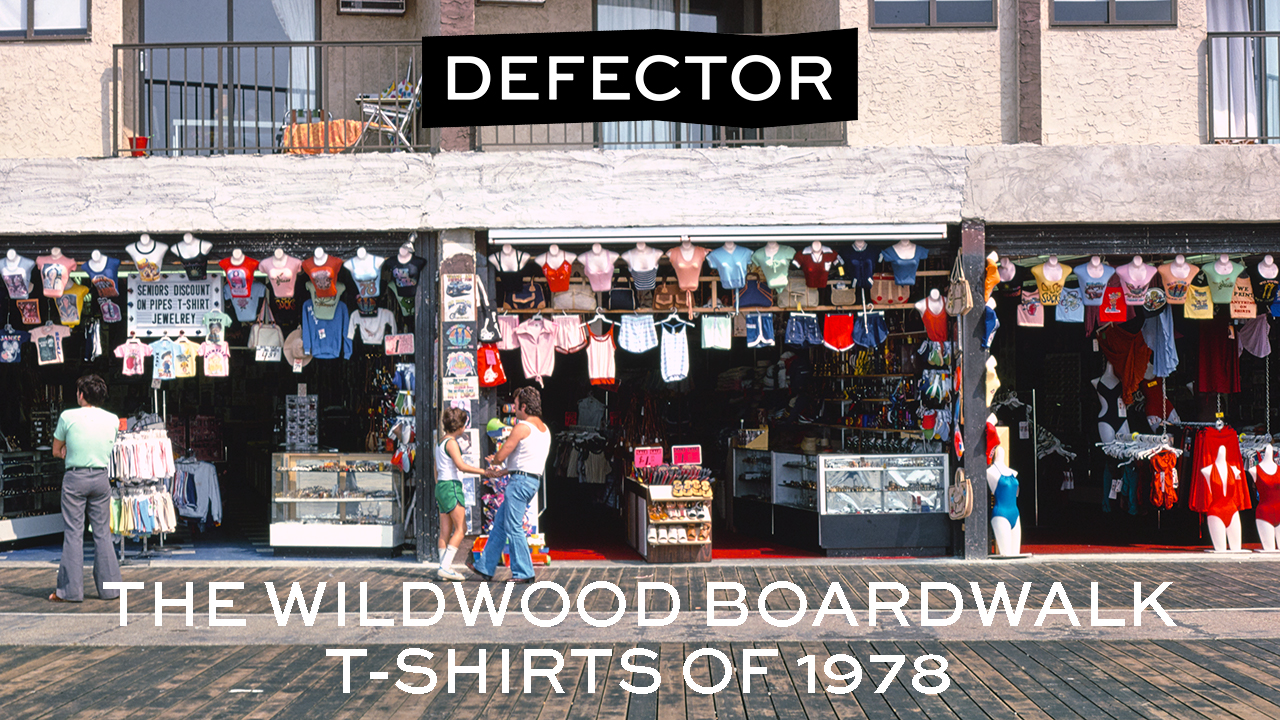The summer of 1978 would’ve been a great time to be in Wildwood, New Jersey. The beaches are long, beautiful, and free. A beach-block apartment cost anywhere from $275 to $325. And there was so much going on there that summer. “It’s a loud, garish, great place to be between 16 and 19,” Mark Forrest, a realtor, told the Camden Courier-Post. “As I see it, people come to Wildwood for three reasons: They want to get a suntan, they want to get a date, they want to raise hell.”
Or not. Sharon Bendick, of Philadelphia, told the Associated Press she was headed to Wildwood that summer because she wasn’t interested in Atlantic City’s new casinos. “They get gambling and they're going to get a lot of prostitutes in,” she said. “A lot of men are going to start coming around without their families, and that's going to cause a lot of conflicts with the family.”
I couldn’t find any data on whether families going to Wildwood instead of AC saved marriages that summer, but the boards were definitely crowded. It was colder than usual that summer, wrote Filip Bondy in New York’s Daily News, but store owner Larry Tanner said his shop was busy. "If anything," Tanner said, "this place has been more crowded than usual. Maybe people can't sit out in the sun, so they come in here.”
Norman Adie, who ran Adie's Fantastic Facts-’n-Feats on the boardwalk, tried to give them some reasons to hang around. In July he hired Sandy Allen, the world’s tallest woman at 7-foot-7, and Chris Greener, a half-inch shorter, and attempted to set them up. “I don’t mind the attention on the job,” Greener said. Allen was laconic about her new job being gawked at on the boards. “If I'd turned it down, I feel like that would be looking a gift horse in the mouth,” she told The New York Times. “Secretarial work wasn't that big a thing to give up, and I figure I can always go back to it. It's hard to do this every day, to psych myself up against what people are going to say when I go out there, making fun and so on. But I'm glad for the chance to talk to people, and I appreciate their interest.”
"Big" was a major theme on the boardwalk that year. After receiving a “check-up” at Children’s Hospital of Philadelphia, a 35-foot tall Raggedy Ann doll was moved to the Wildwood boardwalk that summer. (She, too, was looking for love. “We understand that she will be scanning the boardwalk in the hope of finding a compatible Raggedy Andy,” The Philadelphia Inquirer’s Gerald Etter wrote.)
One thing that didn’t happen on the boardwalk that year was a flagpole sitter. In April, Adie and the Boardwalk Mall hired a New York City PR firm to blast the word out across the world, or at least the tri-state area: The mall would pay $10,000 to the person “who is selected to become known around the world as the greatest of seashore flagpole sitters.” The winning applicant would get a little apartment with 7-foot high ceilings, a phone, TV, radio, running water, electricity, and a lounge chair at the top of a flagpole.
How would a mall possibly put an apartment at the top of a flagpole? We did not find out. The mall picked 21-year-old Joel Lazar out of 750 applicants for the job, but Wildwood wouldn’t grant the mall the zoning to put up the flagpole-apartment. “If we permitted this to happen, others would come up with all kinds of gimmicks,” Wildwood commissioner Wilber Ostrander said. Lazar was heartbroken. “It’s kind of demoralizing,” he said. “People keep coming up to me and asking why I backed out from sitting on the pole.” He later sued for $250,000.
So, yes, the summer of 1978 would have been a great time to be in Wildwood—if not for a vote the city took on June 20, the day before summer began. That day, Wildwood made it illegal to go shirtless anywhere but the beach.
This was a 1970s shore town trend. In the 1950s, when the Jersey shore surged in popularity as a vacation destination, visitors would walk the boardwalk in their Sunday best. (My mom has shared a story about how they’d sell little cups for your heels so they wouldn’t slide through the spaces between the boards.) But changing attitudes and social mores led to people wearing less and less clothing on the beach. Some shore town governments attempted to make people dress nicer by force.
It was a trend. The News of Paterson wrote an editorial saying it was “that time of year again” when shore towns passed laws designed to annoy their tourists. Cape May, at the tip of South Jersey, banned “skin-tight, form-fitting, bikini-type shorts or slacks.” On Long Island, Ocean Beach literally banned eating in public. And Wildwood banned going shirtless on the boardwalk.
Technically, you had to wear a shirt anywhere in Wildwood in public besides the beach. The ordinance said “all persons over the age of 12 years are prohibited from traveling or being upon the streets, avenues, highways, public ways, public parks or boardwalk or any other public place except the beach in the city of Wildwood in bathing suits, or other scanty attire unless they are clothed with a cloak or other suitable outer garment extending from the neck or top of the shoulder to within 10 inches above the knee which cloak or outer wrap or garment shall be fastened with buttons, snaps, zippers, lacing, frogs or other suitable fasteners.” Be sure to wear your cloak on the boardwalk, and fasten it with frogs!
Wildwood had this ordinance for decades, but it went unenforced, and was repealed the winter before. But the city said residents and tourists had complained about scantily clad tourists, and so it re-instated the ban. “I don’t think we're being prudish, not prudish at all, we’re just looking for some decorum.” Wildwood Mayor Guy Muziani told the Inquirer’s George Anastasia, who added that the mayor offered this observation “without even being asked the question.” Muziani scoffed at the idea of the law being an overreach: “When you talk about rights, what about the rights of the mother and father with young children? Don't they have a right to see that their families are not exposed to some of this? Did you ever see those see-through suits some of those young babies are wearing? I mean people resent that. … I don't think we should have that on the streets.”
Again, the law wasn’t really enforced, as bare-chested men strolled the boardwalk throughout the day. Muziani said daytime decorum wasn’t really the law’s intention, though. “It’s at night that I’m mostly concerned about," he told the AP, "when families are dressed up and walking on the streets and the boardwalk.” While Muziani was happy to leave it there, it turned out that the ACLU did want to talk about rights. They challenged the Wildwood law, as well as the ban on tight pants in Cape May, with a stunt late in the summer in which ACLU Atlantic City office head Jack Barense walked in front of a boardwalk police station without a shirt and was given a summons to appear in court. (This wasn’t the first time Barense got in trouble for being bare-chested; a few years earlier, he lost his job at Stockton State College for holding nude classes.)
The gambit didn’t work! A judge said Barense was not shirtless enough for it to be a violation of the law. Wildwood vowed to enforce the law the following summer, but I could not find any evidence of people being ticketed for it in 1979. The law is no longer on the books.
I have long chronicled the t-shirts of the Wildwood boardwalk, an economy and uniquely Wildwood culture that continues today. But what a summer it was for shirts in 1978—legally, you had to wear one on the boardwalk. The Library of Congress holds the late kitsch-architecture photographer John Margolies’ Roadside America collection. In 1978, Margolies traveled to Wildwood to snap photos. Naturally he got some shots from the boardwalk, which means we have visual proof of the t-shirts people were legally required to purchase that year.
Cheeky bathing suits
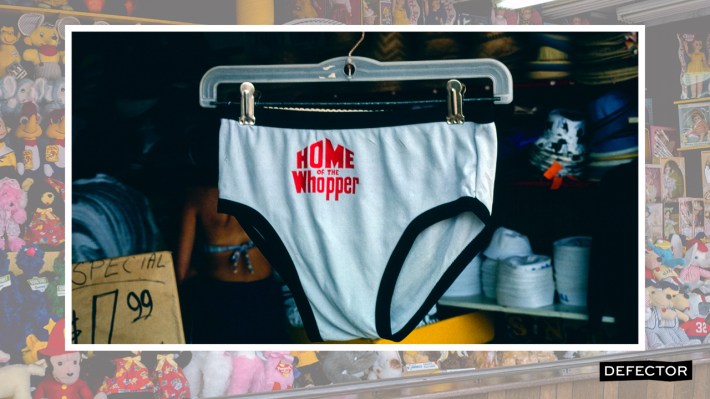
In photographing Wildwood in 1978, Margolies took photos of several storefronts, and the busy images were just detailed enough for me to pull out some of the images for this column. But Margolies took one close-up photo of one product in Wildwood that summer, and it was of this tighty-whiteys-lookin’ Speedo-style bathing suit, screenprinted with Burger King’s “Home of the Whopper” slogan. Here it is, finally: evidence that the found art of Jersey shore boardwalk merchandise goes back to at least the 1970s. Perhaps one day we will go back even farther.
Some fun facts about Wildwood and this suit: Both the Wildwoods and the city just south of it, Cape May, have long attracted vacationers from Quebec. Unfortunately there is no great story behind this otherwise unexpected connection. In the late 1960s, Cape May County opened a tourism office in Montreal—which was suddenly only an eight-hour drive from Wildwood after the recent completion of the New York State Thruway and the Garden State Parkway. French Canadians have a lot of time off in the summer thanks to Quebec’s construction holidays and took advantage. That tourism has ebbed some over the years—when the exchange rate is bad, Canadian tourism goes down—but in non-pandemic years Je me souviens license plates are still common.
In the 1970s, Wildwood loved Canadian tourists. “The Canadians are 600 miles away,” Louis Rodia Jr. of the Puval Hotel in Wildwood told The New York Times in 1973. “They come farther and stay longer than most others who vacation here and protect their deposits by keeping their commitments. Without them in the last ???? years we would not have had good seasons.” (Yeah, the Times quote really says “last ???? years.” Donald Janson had a successful career as a Times correspondent, but clearly he couldn’t make out what Rodia Jr. said in his notes and forgot to go back to fix it. It’s OK—they once had to run a correction for me there, too!)
Because of the influx of Quebecois tourists in the decades since, South Jersey shore towns have occasionally had issues with year-round residents' complaints about Speedo-style bathing suits. This is perhaps not surprising, given that these are the same towns that also tried to ban going shirtless. Cape May only repealed its ban on such swimsuits (and shirtless men) in 2005. So, yeah, that's probably why there is a Speedo for sale that says “Home of the Whopper” on it. The only downside is “the whopper” sounds more like a giant shit than anything dong-related. What’s it say on the back of those briefs?
Music t-shirts
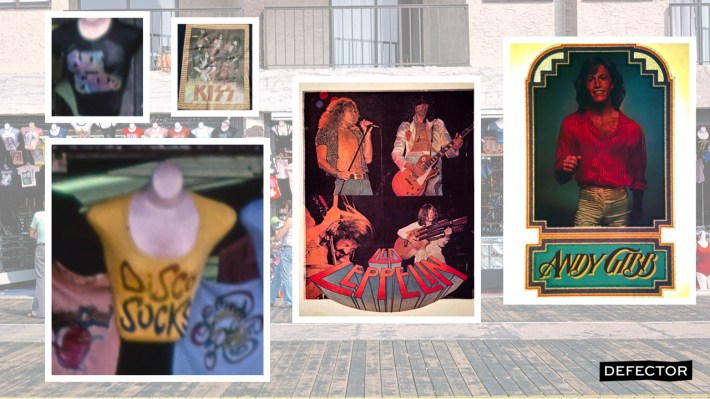
One thing that struck me about last year’s crop of t-shirts on the Wildwood boardwalk is how shirt sellers have essentially no qualms about selling basically anything they can put on a t-shirt. They do not discriminate against any customer. Last year, this expressed itself through Back The Blue shirts being sold right next to George Floyd memorial shirts. Black Lives Matter, All Lives Matter, even Small Booties Matter (on the ass of a pair of boy-shorts) were all represented, and very much for sale.
In 1978, it was expressed this way: Andy Gibb shirts right next to ones that proclaimed “Disco Sucks.” Saturday Night Fever had premiered in December of 1977 and the disco craze was at its height by that summer. This led to the reactionary Disco Sucks counter-craze—a slogan and a pseudo-movement that culminated, the following year, in the disastrous Disco Demolition Night promotion in Chicago. Isn’t this how Wildwood t-shirts always are? A silly slogan that could just be a throwaway gag lambasting popular music of the time, but which also implies a white rock music fan’s disgust at the gay, black music taking over the radio dials. I mean, 40 years later the people behind “Disco sucks” were still giving interviews, saying they weren’t trying to be racist with the slogan. You don't have to strain too hard to hear the same argument echoing off the 1978 Wildwood boardwalk.
Despite the looming “threat” of disco, rock music fans had their choice on the boards that year. Fellow Defector worker Dave McKenna informs me that when he saw Led Zeppelin in 1977, “Jimmy Page was wearing that exact white silk snake suit” emblazoned on the Zep posters for sale. They are, indeed, all wearing the same getup at that concert that they are in the poster.
Teen heartthrobs
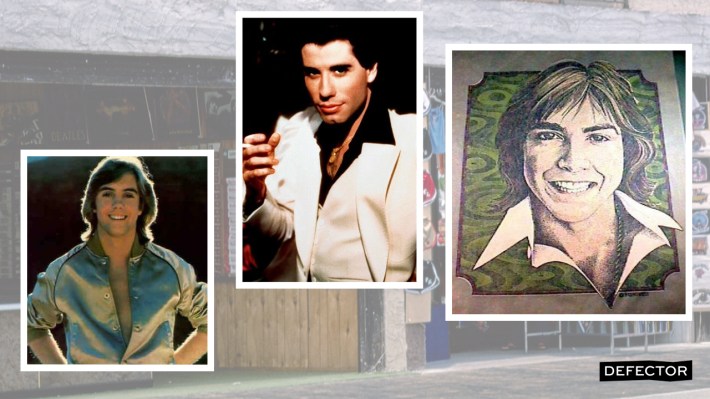
The “Disco sucks” crowd still had to contend with a lot of pop on the boardwalk that year. The trend seemed to be photos or photo-realistic drawings ironed onto t-shirts—nothing fancy, no mashups of John Travolta wearing a leisure suit and hanging out with the Rice Krispies elves or whoever. Shaun and David Cassidy were also prominent presences on the Wildwood boardwalk that year, if the Margolies photos are any indication.
Cars and Bikes
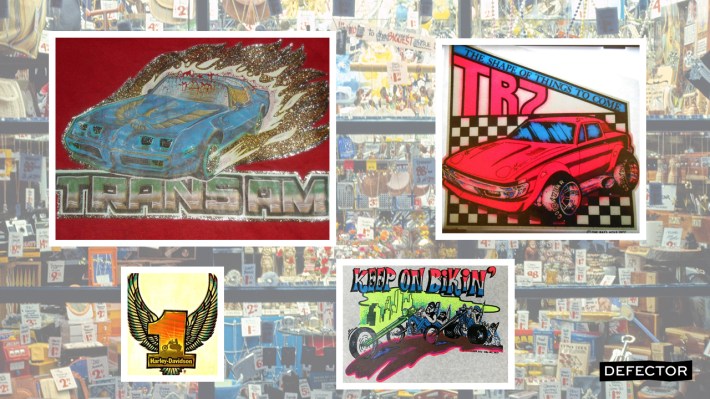
Shirts that show off what car or motorcycle you think is coolest are staples of boardwalk fashion, and some popular ones in 1978 were the Trans Am, the Corvette and Harley Davidson. Nothing out of the ordinary there, really, although there were also “Keep on bikin’” shirts that riffed off R. Crumb’s art. My favorite shirts, though, were for the Triumph TR7, apparently “the shape of things to come.” This is correct, as the TR7 is a car we all know and love and drive today.
A Touch of Class
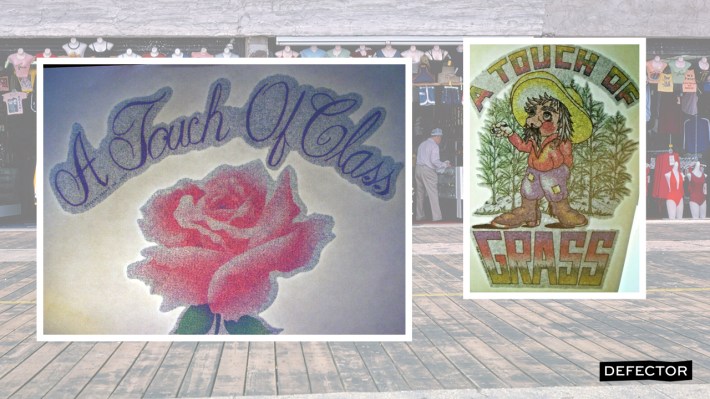
This one is a bit of a mystery. There are plenty of shirts on the boardwalk with “A Touch of Class” and a rose on them, but I couldn’t quite seem to find the referent. Is it really the 1973 film A Touch of Class? Sure, why not. Anyway, the shirt was popular enough to inspire parody shirts, as shown by the much easier to interpret "A Touch Of Grass” weed shirt.
Shirts about what stupid goobers kids are
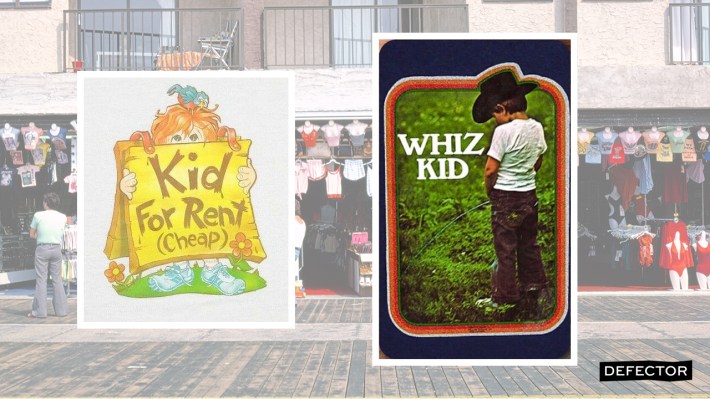
Here’s some cute kids shirts. One is about as close as you can get to selling underage nudity on a t-shirt without it being a problem—a shirt featuring the Nevermind cover is closer, still—and the other is about your kids being so annoying that you give them away. Parenthood!
Shirts about what stupid goobers men are
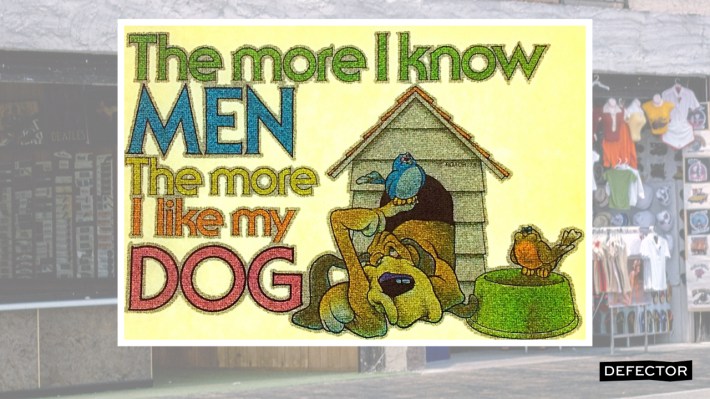
Can you believe this isn’t a cat joke?! It seems so progressive.
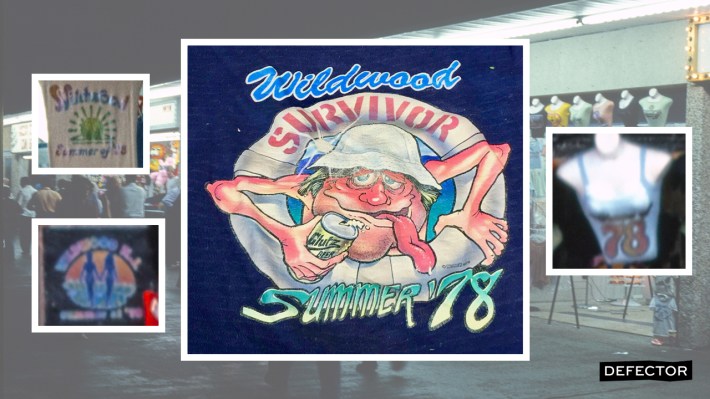
And, finally, some images of shirts specific to Wildwood 1978. I actually purchased the shirt in the center of this image off eBay. Incredibly, the image of a drunken, bucket-hat-clad louse drinking a can of Glutz Beer was made to fit a five-year-old. That’s much better than going shirtless.
